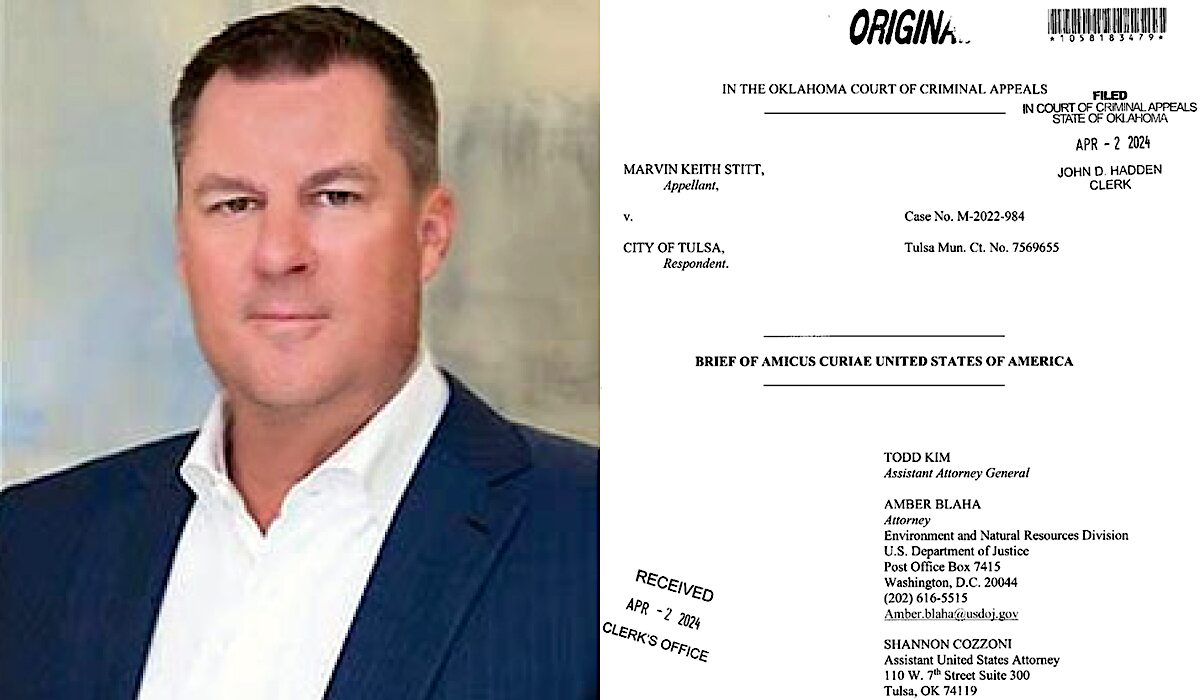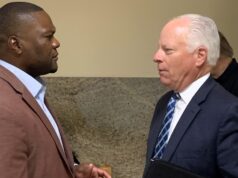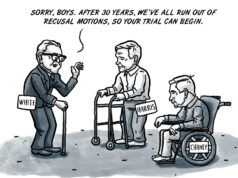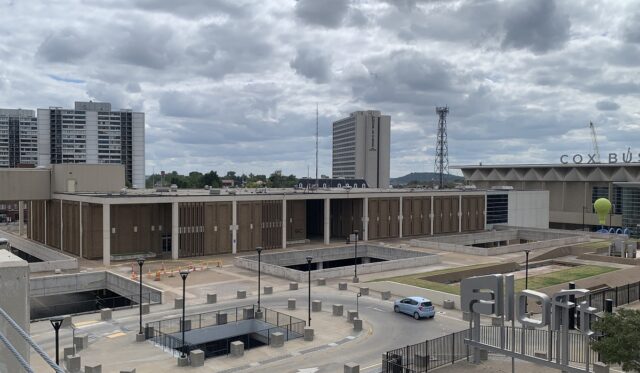

In a decision that could determine whether Oklahoma municipalities inside Indian Country reservations retain criminal jurisdiction over tribal citizens under state law, the state Court of Criminal Appeals appears set to rule on the case of an Osage Nation citizen charged by the City of Tulsa for several traffic offenses in the Muscogee Nation Reservation.
Replete with inflammatory statements about “outlaws such as the James brothers” and “stereotypes about drunken Indians,” court filings from the case also offer insight into the tense intergovernmental dispute between the city and tribal governments. For instance, a pair of affidavits from Muscogee officials in March indicate neither government forwards the other traffic tickets for prosecution despite being able to do so under cross-deputization agreements.
Since the McGirt v. Oklahoma decision functionally upheld eastern Oklahoma as a series of Indian Country reservations, the City of Tulsa and other municipalities have been understood to lack the criminal jurisdiction needed to prosecute tribal citizens in municipal court. The Muscogee Nation lacks the jurisdiction to prosecute non-tribal citizens for traffic offenses in its tribal court.
According to court filings, Nicholas O’Brien was charged in August 2021 with driving under the influence, transporting an open container, having an expired tag, traveling left of center and improper use of the left lane in the City of Tulsa’s municipal court. After several delays, O’Brien’s attorney filed a motion to dismiss based on the McGirt decision in October 2022, but the motion was denied by Judge Mitchell McCune based on the argument the city retained criminal jurisdiction under the Curtis Act of 1898.
After the 10th U.S. Circuit Court of Appeals found the Curtis Act did not grant the city criminal jurisdiction in Hooper v. City of Tulsa, McCune reversed course and granted a second motion to dismiss in August 2023. The city appealed, putting the case in front of the five-judge Oklahoma Court of Criminal Appeals.
Tulsa attorneys: City can prosecute tribal citizens
The O’Brien case is not the only Tulsa traffic ticket legal dispute pending before the Oklahoma Court of Criminal Appeals. But while a case involving Gov. Kevin Stitt’s brother, Keith, shares the same legal issue, the nature of the O’Brien case’s dismissal could present a a more straightforward question for the state’s top criminal court to answer.
Becky Johnson, senior assistant attorney for the City of Tulsa, made three main arguments in the city’s appellate brief:
- The municipal court did not lack subject matter jurisdiction;
- The Bracker balancing test would allow the city to have concurrent jurisdiction over tribal citizens; and
- The Curtis Act allows the city to prosecute tribal citizens.
The city’s arguments based on the Curtis Act are not substantially different from its arguments that were rejected by the 10th Circuit Court of Appeals last year.
The Bracker balancing test is based on the U.S. Supreme Court case White Mountain Apache Tribe v. Bracker and instructs courts to balance the competing interests of state, federal and tribal governments. At least four of the judges on the Oklahoma Court of Criminal Appeals have previously signaled their willingness to apply the Bracker test — which has only been applied by the U.S. Supreme Court to analyze non-Indian conduct — to determine whether the state has criminal jurisdiction over Native American defendants.
RELATED
‘Oklahoma lacks jurisdiction’ in Keith Stitt speeding ticket case, U.S. attorneys say by Tristan Loveless
Johnson’s brief spent 11 pages arguing how the court should balance the state, federal and tribal interests in municipal criminal jurisdiction and concluded by arguing that the City of Tulsa should share concurrent jurisdiction over traffic cases with tribal courts.
“To be clear, the city does not argue that the tribes have no jurisdiction at all within the city limits, but only that there is shared concurrent jurisdiction with the city/state over Indians,” Johnson wrote. “Indian citizens who live within the tribe’s reservation boundaries are also citizens of the state and many are citizens of or visitors to the city as well. All of these governments hold at least an equal interest in maintaining the safety of all citizens and visitors, although the city has shown it has a paramount interest in governing within the city. Concurrent jurisdiction serves only to further the common goal of public safety.”
While the Bracker balancing test calls for a balancing of three governments’ interests, no federal brief was filed in the case, and the Muscogee Nation declined to make a full Bracker analysis in its amicus brief. In fact, the nation’s amicus cautioned the court against traversing the Bracker rabbit hole while criticizing Tulsa’s application of the legal analysis.
“Tulsa illustrates the perils of judicial balancing by canvassing in its Bracker arguments a broad array of matters ranging from its provision of utilities and infrastructure, to land status and demographics,” the Muscogee Nation’s brief argued. “Tulsa makes no credible effort to explain the relevance of such facts to the issue of criminal jurisdiction over the less than 5 percent of its residents who are Indian — leaving it to the court to unilaterally ‘assign a policy-based’ weight to those facts.”
The Muscogee Nation’s brief pointed to the impracticality of the court having to weigh the investment of the tribe and the city to determine criminal jurisdiction, citing the nation’s investment in health infrastructure in Tulsa accessible to non-Indians, a $440 million investment in a “major energy infrastructure and development project in south Tulsa,” and the nation’s domestic violence prevention programs available in Tulsa and accessible to non-natives.
The city also argued the municipal court did not lack subject matter jurisdiction based on the Court of Criminal Appeals decision in Deo v. Parish, which held that Oklahoma has subject matter jurisdiction over tribal citizens but lacks personal or territorial jurisdiction. McCune had dismissed O’Brien’s case for lacking subject matter jurisdiction a few months before the Deo decision clarified the distinction between subject matter, personal and territorial jurisdictions in Oklahoma law.
Muscogee Nation calls Bracker analysis a ‘fool’s errand’
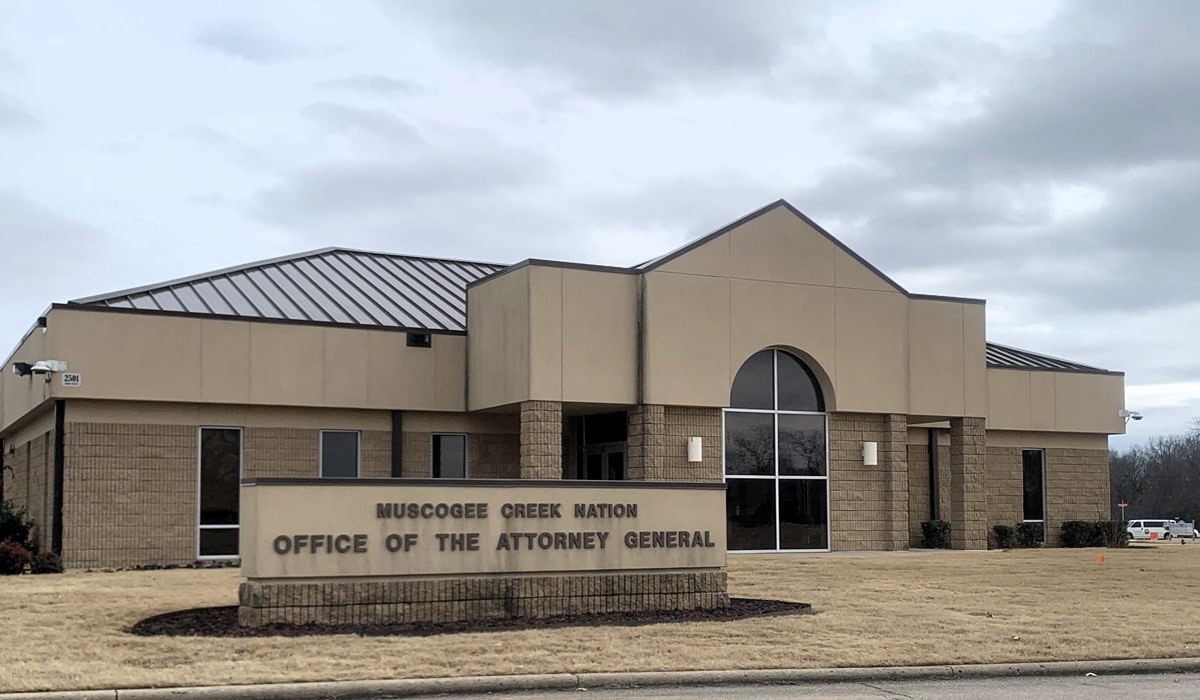
A footnote in the city’s brief drew an accusation that “Tulsa appeals to prejudice” from the Muscogee Nation’s attorneys.
“The safety concern to the general public caused by persons believing they can speed and drink and drive without repercussion is clear,” Johnson wrote in a footnote that claims there has been an increase in fatal traffic collisions since the McGirt decision in 2020.
Attorneys for the tribal government said the argument was “reprehensible” and “persons” clearly referred to Indians.
“The vast majority of Creek citizens and other Indians within the reservation are responsible and law-abiding. Tulsa cites no credible evidence for tarring these good people with an argument sounding in stereotypes about drunken Indians,” the brief said. “The claims peddled by Tulsa’s counsel are beneath the dignity of the city.”
Tulsa’s brief also invoked Oklahoma’s outlaw history, claiming that jurisdictional issues involving jails made the city a hiding place for criminals in the wake of the McGirt decision.
“This conundrum has made almost half of Oklahoma a hiding place for tribal members with outstanding warrants from other tribes just as the eastern side of the state was a hideout for outlaws such as the James brothers, Bonnie and Clyde, Pretty Boy Floyd and others,” Johnson wrote.
The Muscogee Nation’s attorneys called the comparison a “junk-drawer argument” with no evidence except a citation to a 2009 Muskogee Phoenix article by writer Jonita Mullins discussing the outlaws’ lore.
After criticizing the city’s arguments, the tribe’s brief argued that attempting to use the Bracker balancing test would result in a slew of similar low-quality arguments.
“The point here is not to respond jot-by-jot to Tulsa’s Bracker arguments. Rather, it is that those arguments amount to a slanted and inflammatory account of the relative sovereign interests at play and as such hinder, rather than assist the court’s truth-seeking function,” the brief argued. “Inviting these governments to engage in regularized adversarial disparagement of each other’s sovereign interests promises to steadily erode what is most needed in eastern Oklahoma: intergovernmental cooperation and respect. Balancing in this context would be a fool’s errand, and a highly damaging one.”
Muscogee Nation and City of Tulsa refuse to forward each other tickets
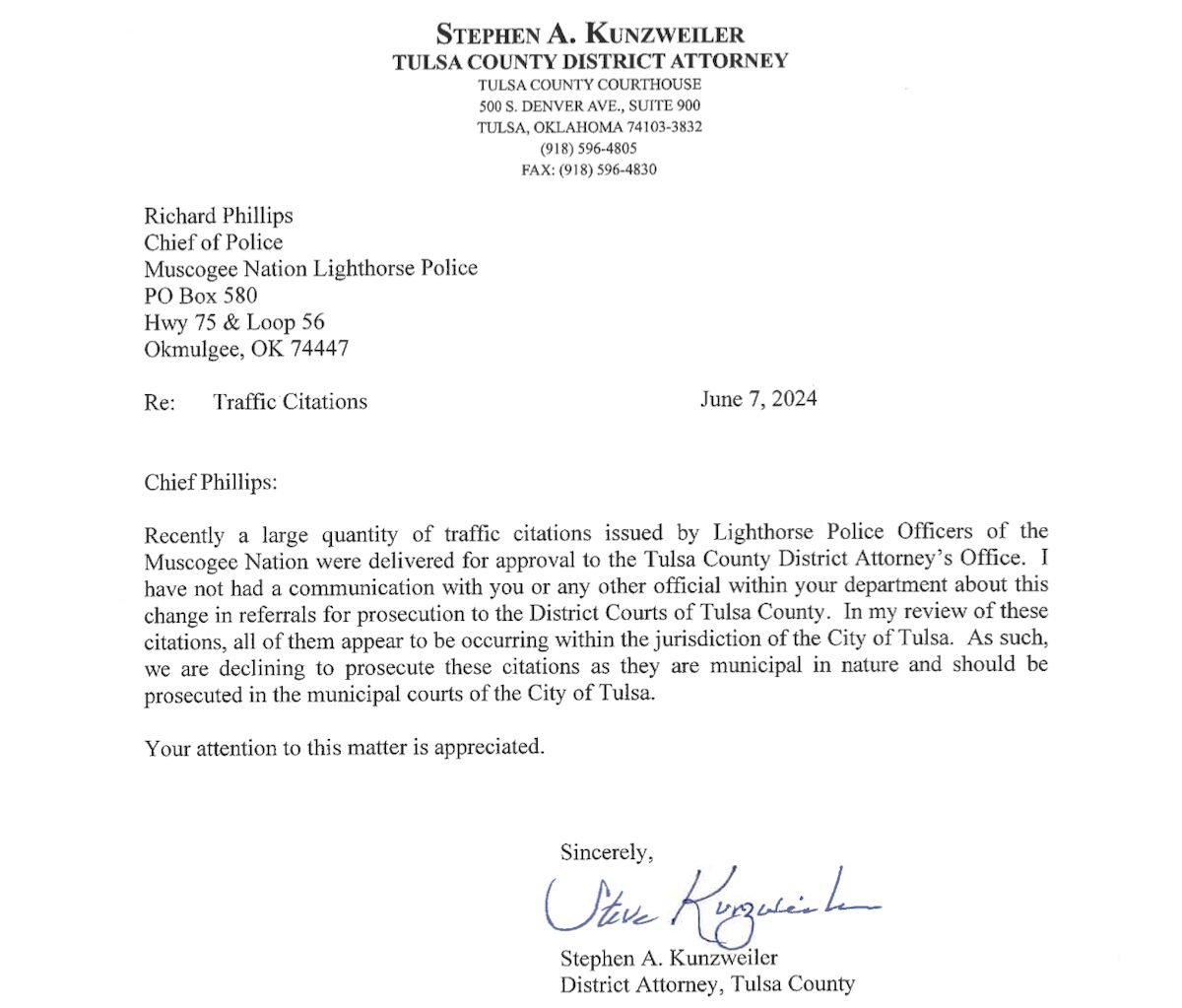
Court filings in the O’Brien case appear to reveal that neither the City of Tulsa nor the Muscogee Nation currently forward the other traffic tickets.
Muscogee Nation Attorney General Geri Wisner said in a March affidavit that the City of Tulsa does not forward traffic tickets to the tribe for prosecution.
“Tulsa refuses to refer traffic citations to the nation,” Wisner said. “Following McGirt, Tulsa has not referred any traffic tickets to the nation notwithstanding its authority to make such referrals under the cross-deputization agreement.”
Another March affidavit by Muscogee Lighthorse Deputy Chief David Wind III indicated that the Muscogee Nation forwards traffic tickets written by its officers in Tulsa County to either “the state prosecutor’s office” or the Tulsa County District Court.
“Lighthorse officers who patrol the City of Tulsa now utilize the same e-ticketing system as the Tulsa Police Department, and this system has been configured by the Lighthorse to allow officers to transfer tickets electronically and seamlessly to the state prosecutor’s office and Tulsa County court systems,” Wind said. “Between Jan. 1, 2023, and Jan. 31, 2024, Lighthorse stationed in Tulsa County issued more than 1,146 tickets and referred them to the Tulsa County Court.”
Despite the nation forwarding its traffic tickets to Tulsa County, the cases are not being pursued there. Tulsa County District Attorney Steve Kunzweiler’s office requested that the Muscogee Nation stop forwarding tickets to his office June 7, according to a letter he sent to Muscogee Nation Chief of Police Richard Phillips.
“Recently a large quantity of traffic citations issued by the Lighthorse police officers of the Muscogee Nation were delivered for approval to the Tulsa County District Attorney’s Office. I have not had a communication with you or any other official within your department about this change in referrals,” Kunzweiler wrote. “In my review of these citations, all of them appear to be occurring within the jurisdiction of the City of Tulsa. As such, we are declining to prosecute these citations as they are municipal in nature and should be prosecuted in the municipal courts of the City of Tulsa.”
Asked Sept. 12 if anything had changed since his June letter, Kunzweiler said he had not received a response.
“I have not heard back since I said we’re not doing anything with these,” he said.
While Tulsa’s municipal courts appear to be prosecuting traffic tickets issued by Tulsa police to tribal citizens, it appears traffic tickets written by Muscogee Lighthorse to non-tribal citizens are not being prosecuted. Like Kunzweiler, Oklahoma Attorney General Gentner Drummond’s office has also declined to prosecute the tickets sent there, said communications director Phil Bacharach.
Muscogee Nation Press Secretary Jason Salsman did not respond to an email request for information regarding tickets issued by Muscogee Lighthorse officers to non-tribal citizens.
(Correction: This article was updated at 3:45 p.m. Friday, Sept. 20, to remove an erroneous reference to appellate processes. This article was updated at 7:15 p.m. Friday, Sept. 20, to correctly refer to municipal courts.)









